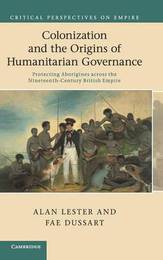
|
Colonization and the Origins of Humanitarian Governance: Protecting Aborigines across the Nineteenth-Century British Empire
Hardback
Main Details
| Title |
Colonization and the Origins of Humanitarian Governance: Protecting Aborigines across the Nineteenth-Century British Empire
|
| Authors and Contributors |
By (author) Alan Lester
|
|
By (author) Fae Dussart
|
| Series | Critical Perspectives on Empire |
|---|
| Physical Properties |
| Format:Hardback | | Pages:294 | | Dimensions(mm): Height 229,Width 150 |
|
| Category/Genre | World history
British and Irish History
Colonialism and imperialism |
|---|
| ISBN/Barcode |
9781107007833
|
| Classifications | Dewey:909.0971241 |
|---|
| Audience | | Tertiary Education (US: College) | |
|---|
| Illustrations |
4 Halftones, black and white; 4 Halftones, black and white
|
|
Publishing Details |
| Publisher |
Cambridge University Press
|
| Imprint |
Cambridge University Press
|
| Publication Date |
17 April 2014 |
| Publication Country |
United Kingdom
|
Description
How did those responsible for creating Britain's nineteenth-century settler empire render colonization compatible with humanitarianism? Avoiding a cynical or celebratory response, this book takes seriously the humane disposition of colonial officials, examining the relationship between humanitarian governance and empire. The story of 'humane' colonial governance connects projects of emancipation, amelioration, conciliation, protection and development in sites ranging from British Honduras through Van Diemen's Land and New South Wales, New Zealand and Canada to India. It is seen in the lives of governors like George Arthur and George Grey, whose careers saw the violent and destructive colonization of indigenous peoples at the hands of British emigrants. The story challenges the exclusion of officials' humanitarian sensibilities from colonial history and places the settler colonies within the larger historical context of Western humanitarianism.
Author Biography
Alan Lester is Professor of Historical Geography at the University of Sussex. His first book was From Colonization to Democracy: A New Historical Geography of South Africa. It was reviewed as 'without doubt the best historical geography of South Africa to date'. Although his work over the next five years remained centred on southern Africa, it focused on the range of connections between the Cape colonial frontier and other sites of British colonization. With Imperial Networks: Creating Identities in Nineteenth-Century South Africa and Britain, he helped to pioneer the spatial turn in colonial studies. Catherine Hall wrote that the book 'provides a model which others would do well to follow' and John Darwin concluded that it 'opens up a very promising avenue towards a reinvigorated imperial historiography'. Excerpts are included in the New Imperial Histories Reader, Stephen Howe crediting Lester with being 'the pioneer' of 'a key concept much used in recent 'new imperial history' writing ... that of the imperial network'. Colonial Lives across the British Empire: Imperial Careering in the Long Nineteenth Century, co-edited with David Lambert, showed how personal trajectories combined with movements of material, capital, commodities and ideas continually to reconfigure colonial and metropolitan places. Antoinette Burton described the book as developing 'fresh insight and a lot of intellectual energy as well', and it has been further reviewed as 'demonstrat[ing] what biography at its best can do'. Fae Dussart is Adjunct Lecturer in Modern British and Imperial History for the University of North Carolina Study Abroad Program and Visiting Research Fellow at the University of Sussex. She has published on histories of domestic service in Britain and India, and with Alan Lester on humanitarian and settler discourses in New Zealand and Australia.
Reviews'Specialists and post-graduate students will find this monograph to be both a compelling and intellectually stimulating history of colonial humanitarianism as well as an important dimension of colonial governmentality and the 'civilizing' mission of the British Empire.' Richard Batten, Imperial and Global Forum (imperialglobalexeter.com) 'Then as now, humanitarianism often served the needs of its benefactors better than its receivers. Lester and Dussart's complex, nuanced, and sympathetic account does much to illuminate the process by which that happened.' Aidan Forth, Victorian Studies
|